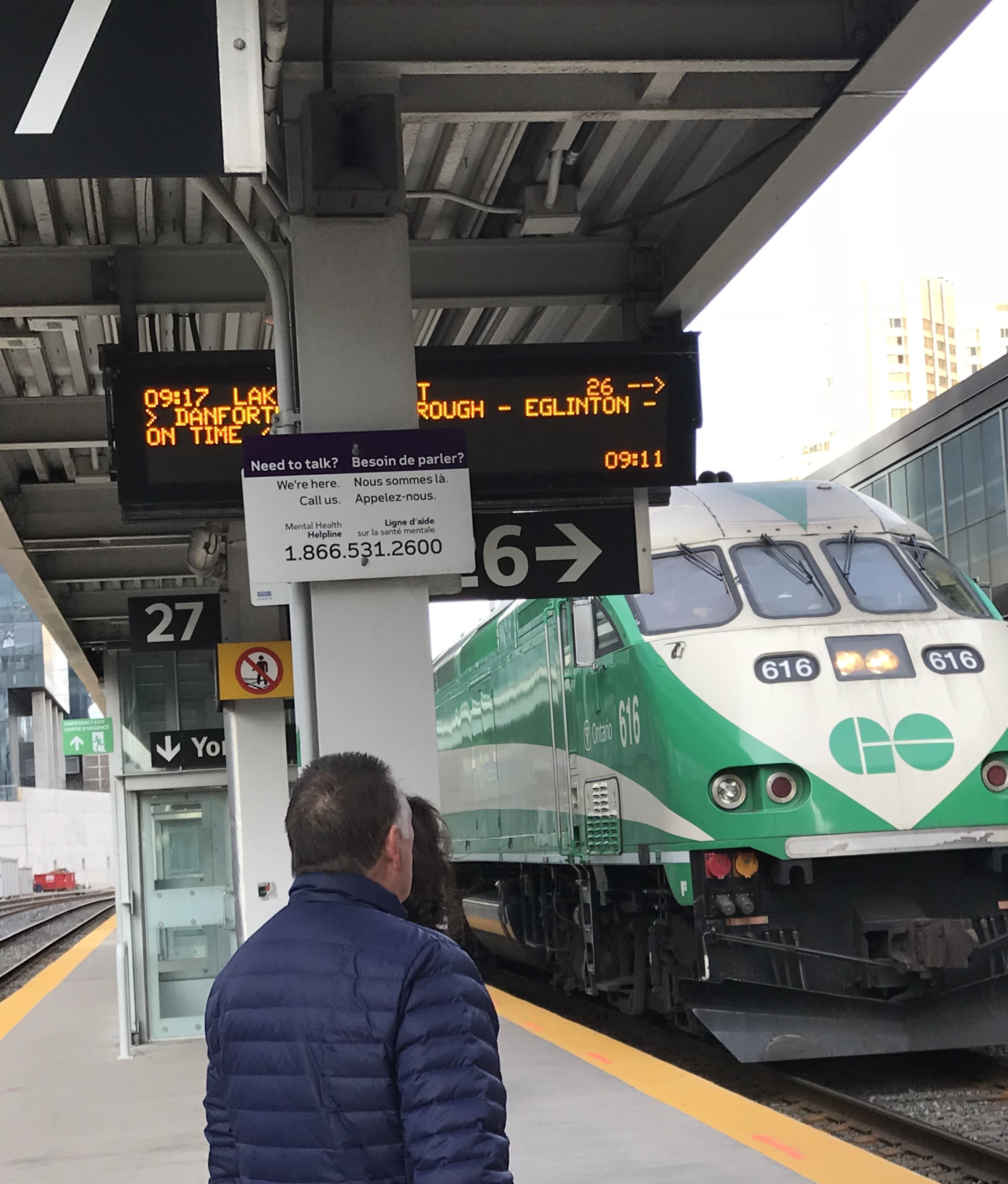GO Train stops twice in one shift due to women near rail line
The incidents highlight both the remarkable and potentially life-saving actions of transit staff.
Nov 29, 2019
Officials are crediting crew aboard a GO train and station staff for responding quickly to two different women in distress along a major rail corridor.
Both unique incidents on Thursday (Nov. 28), took place during one shift for the train staff, as they moved across two different GO rail corridors.
In both cases, the crew stopped their train when they were alerted by station staff who had noticed the women in obvious emotional distress – one during rush hour on Thursday evening and second a short time later.
In the still from security footage, Bombardier crew members of a stopped GO train talk to a young woman in crisis on Thursday, Nov. 28. (Metrolinx photo)
“I did what anyone else would do,” said Clint Nicholson, a train conductor who has operated GO Trains for the past two and a half years.
The day before the incident with the two women happened to be the one year anniversary of a suicide involving a train Nicholson was operating.
“My co-workers and employer were incredibly supportive,” he said.
“I never want anyone to have to go through that so I am so happy we, as a team, were able to support these young women in time and they hopefully get the support they deserve.”
There were many staff involved in helping ensure both women remained safe, including Matt Boucher, a supervisor in train operations. He, along with others, brought compassion and a calming voice at a time of personal crisis for the two strangers.
It is our goal at Metrolinx, through the Suicide Prevention Working Group, that more staff participate in intervention training. Transit Safety Officers, who intervene in over 50 situations involving people in crisis every month, have been trained to identify the warning signs often exhibited by people considering suicide and how to respond appropriately to people in emotional distress.
A Bombardier crew member speaks with a young woman in distress on Thursday, Nov. 28. (Metrolinx photo)
“Making a connection, being with someone, just listening…sometimes that’s all a person needs,” said Nicholson thinking back over both incidents on Thursday.
Jesse Murphy, the engineer at the controls of both trains, said he and his partner – both Bombardier employees – first noticed an abandoned backpack at a station. Then as they moved to begin their shift, they saw a teenager sitting down.
He pulled the train to a stop, and asked her if she was alright.
“She started crying,” he said.
Train traffic was stopped, and from a number of different directions, people were called on to help the girl.
With the teen now getting assistance, the train crew moved on. Minutes later as darkness fell, Murphy and partner Nicholson saw another woman also in distress as they moved their train along at 30 mph. She was rocking back and forth.
They stopped their vehicle, and radioed for all other train traffic to come to a stop.
Like the young girl, the older woman was guided to safety by a community that came together.
Murphy said he’s used to tending to the safety of thousands of people aboard the trains he guides.
“But this was heavy,” he said of the emotional weight of the shift, adding he and his partner just happened to be the two people in the seats in two particularly important moments in time.
Coming to the aid of the women was a community response.
In the middle of a quiet period during the evening rush, Metrolinx station attendant Sam Bourdon received a call that there was a woman in distress, down the line from her Lakeshore West station. A train, she was told, had stopped for the person.
“I just started walking as quickly as I could, not knowing anything other than she was a female who needed help,” said Bourdon, who’s worked 21 years as a station attendant.
She found a train crewmember and the teenage girl – dressed in warm clothing and a backpack full of books – talking.
Bourdon took over, and began escorting the young woman back toward the ticket booth.
“She was very quiet – very submissive,” Bourdon recalled. “I just started talking to her.”
The pair talked until another transit official, and later the police and transit safety officers, arrived to help.
It was clear the young woman was feeling desperate, said the station attendant, and as a mother of three grown women, Bourdon said she hopes she gets the support she needs.
She also believes it’s a lesson for staff and even customers. The girl looked, outwardly, like any other student.
“We all have to keep our eyes open – especially these days,” she noted.
Sometimes reading about suicide can be difficult and triggering.
There is hope today can be better.
Metrolinx has partnered with ConnexOntario to install hundreds of signs throughout our rail network that direct to mental health support services. Please reach out for support by calling 1-866-531-2600.
For more information on Metrolinx and suicide prevention across the GO network, please click here.
by Anne Marie Aikins Chief spokesperson
